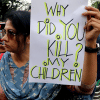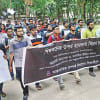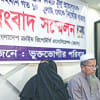Flawed logic for quota
"It will not be a contempt of court if an observation is not abided by [any party to the case]."
Law Minister Anisul Huq
The government has been referring to a Supreme Court “order” on the reservation of 30 percent quota for the children of freedom fighters for the last few days, arguing that it cannot be changed.
But the fact is it was a mere observation of the court and the government has no obligation to abide by it, legal experts have said.
In a verdict in 2015, the Appellate Division of the SC said, "The High Court Division observed that the reservation of 30 percent quota for the children of freedom fighters shall be followed strictly."
Judges, jurists and scholars all over the world have long ago concluded that observations, also known as remarks or opinions of judges, in a verdict are not binding upon any parties to a case.
Law Minister Anisul Huq and other legal experts have said that this well-settled principle is being followed in our judicial system for long.
Liberation War Affairs Minister AKM Mozammel Haque, however, thinks otherwise.
He termed the SC's observation an "order" and claimed that it was binding on the government.
He came up with this interpretation at a press conference on Wednesday, and strongly opposed any change in the existing 30 percent quota for freedom fighters' children and grandchildren.
"There is no scope for bringing changes to the 30 percent freedom fighters' quota in public jobs because of a Supreme Court order. I think it will be a contempt of court if any decision is made ignoring the court's order," he claimed.
He said a copy of the apex court order has been sent to the seven-member committee formed by the government to "review or reform or cancel" the quota system.
The minister hoped the committee would keep the freedom fighters' quota intact and recommend bringing reform to other quotas.
On Thursday, Prime Minister Sheikh Hasina in parliament referred to Mozammel's statement and asserted that there was no scope of bringing changes to the quota for freedom fighters' children and grandchildren.
“Since the High Court has already decided that freedom fighters' quota is going to stay, how can we go against this verdict?” she asked.
Earlier in April, she told parliament that the quota system would be abolished altogether.
At present, 56 percent of government jobs are reserved for candidates under various quotas -- 30 percent for freedom fighters' children and grandchildren, 10 percent for women, 10 percent for people of underdeveloped districts, five percent for members of indigenous communities and one percent for the physically challenged.
The quota reform movement, waged by students of various universities, want a logical reform of the quota system, which they say is unjust and unfair.
On Saturday, The Daily Star asked the liberation war affairs minister if it was really mandatory to abide by the court's observation.
He said the observation on the quota system was first made by the HC and was upheld by the SC. "So it has become an order of the court. And we are obliged to abide by it."
But the SC itself considered the HC remarks as an observation, and not as an order.
Law Minister Anisul Huq's explanation also does not support Mozammel's interpretation.
"An observation made by the High Court or the Supreme Court remains as an observation until and unless it is made a part of the order. And it will not be a contempt of court if the observation is not abided by [any party to the case]," he told The Daily Star on Monday.
But he added any observations by the HC and the SC should be taken very seriously.
Former law minister Shafique Ahmed has said SC's observations are actually opinions of the judges.
"If anyone does not abide by the court's observations, it will not be a contempt of court," he told this newspaper on Monday.
He also spoke about the persuasive significance of such observations and said lawyers could use those in courts while dealing with other cases.
Eminent jurist Shahdeen Malik gave the same opinion.
In their authoritative book called “Ain Shobdokosh” (Law Glossary), former chief justice Mohammad Habibur Rahman and Prof Anisuzzaman also said there was no obligation to abide by observations as precedence.
The Supreme Court in India has discussed in many cases whether observations have any binding effect, and upheld the internationally well-settled principle: no binding effect.
Analysing a number of cases, Justice GS Singhvi, a former eminent judge of the Indian SC, in an article in 2011 said: "It is well settled that obiter dictum [observation] is a mere observation or remark made by the court by way of aside while deciding the actual issue before it."
The mere casual statement or observation which is not relevant, pertinent or essential to decide the issue at hand does not form the part of the judgment of the court and have no authoritative value, he wrote in the article titled "Concept of Obiter Dicta: The Law".
"The expression of the personal view or opinion of the judge is just a casual remark made whilst deviating from answering the actual issues pending before the court. These casual remarks are considered or treated as beyond the ambit of the authoritative or operative part of the judgement," stated Justice Singhvi, who was also chief justice of Andhra Pradesh High Court.
Long ago, The Wharton's Law Lexicon: an epitome of the law of England, which was first published in 1848, concluded that observation has no binding effect. It defines the term “obiter dictum” as an opinion not necessary to a judgement; an observation as the law made by a judge in the course of a case, but not necessary to its decision, and therefore of not binding effect; often called as obiter dictum; a remark by the way.
According to Halsbury's Laws of England, a uniquely comprehensive encyclopedia of law first published more than one hundred years ago, mere passing remarks of a judge are known as “obiter dicta” and they have no binding authority on another court.
The SC's observation we are discussing was made in a case related to the retirement age of freedom fighter officials in government service. The reservation of quota system was not an issue in the case. The judges made some comments on the reservation of quota system in deciding the case on retirement age of freedom fighter officials. (See side story on the case and verdict on it.)
So it is clear that the remark on reservation of 30 percent quota for the children of freedom fighters is a casual opinion and it is beyond the operative part of the judgment and has no authoritative value or binding effect.
Therefore, it depends on the government whether it will bring any changes to the existing quota system.
A recent HC order also indicates that the court is unwilling to interfere in it. On March 5 this year, the HC rejected a writ petition that challenged the quota system, saying that the matter was a policy decision of the government.
The liberation war affairs minister's claim, however, is a policy of convenience.
He has now banked on the observation to oppose reform in the quota reserved for freedom fighters' children and grandchildren while the main order of the same judgment remains unimplemented for the last six years.
In its 2012 order, the HC had directed the government to give service benefits to retiree freedom fighter officials and employees by increasing their retirement age by one more year with retrospective effect from 2010.
Earlier in February 2010, the government raised retirement age of freedom fighter officers and employees to 59 years from 57.
In 2013, the government further raised their retirement age by another year, to 60.
For non-implementation of the HC order, a contempt of court case was filed in 2013 against some senior officials. The case remains pending with the HC for five years.
After the liberation war affairs minister's claim, a fresh point is being discussed on social media. Some people argue that the court in its observation spoke about reservation of quota for children of freedom fighters. But the government in 2011 introduced a new rule, allowing grandchildren of freedom fighters to get benefit of the system which is outside the court's observation.
In the past, the government did not honour many court observations. But no contempt of court proceeding was taken against the government for it, as those were not binding upon the government.
For example, in the 13th constitutional amendment case verdict, which declared the caretaker government system unconstitutional in 2011, the SC observed that the caretaker system may be kept in place for holding two more general elections. It also observed that parliament should be dissolved 42 days before announcement of the election schedule.
But the government followed none of these observations though it has abolished the caretaker government system banking on the court's verdict.

 For all latest news, follow The Daily Star's Google News channel.
For all latest news, follow The Daily Star's Google News channel. 







Comments